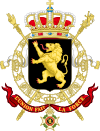Politics and government of the Brussels-Capital Region
| Government of the Brussels-Capital Region | |
|---|---|
| Gouvernement de la région de Bruxelles-Capitale Brusselse Hoofdstedelijke Regering | |
 | |
| Overview | |
| Established | 12 July 1989 |
| Country | Belgium |
| Polity | Brussels-capital Region |
| Leader | Minister-President |
| Appointed by | Parliament of the Brussels-Capital Region |
| Headquarters | Hôtel de Grimbergen, City of Brussels |
| Website | be.brussels |
| Politics and government of Brussels |
|---|
 |
The government of the Brussels-Capital Region is the political administration of the Brussels Capital Region of Belgium.[1][2] An election is held every five years. The government is headed by a Minister-President (currently Rudi Vervoort), four ministers and three state secretaries.
Additionally, there is a Governor of the Brussels Capital Region, who is appointed by the cabinet and has the responsibility to enforce laws concerned with public order in the Brussels-Capital Region. The governor's powers are relatively limited.
The Brussels capital region is divided into 19 municipalities. Each municipality has its own government, responsible for the handling of local level duties, such as law enforcement and the upkeep of schools and roads within its borders.[3] Municipal administration is also conducted by a mayor, a council, and an executive.[3]
Parliament
The Parliament of the Brussels-Capital Region is also known as the Brussels Regional Parliament. It is the main decision-making body for the Brussels-Capital Region. Constitutionally, the parliament is made up of 72 French-speaking members and 17 Dutch-speaking members.
Functions

The Brussels Parliament role mainly consists in controlling the government of the Brussels-Capital Region, approving the budget and creating and passing legislation in regional matters, known as ordinances, which are legally binding. One of its first tasks after the Parliament is renewed is appointing five ministers and three regional secretaries of state, who together form the cabinet of the Brussels-Capital Region.
The 89 members of the Brussels Parliament are divided into two language groups: 72 belong to the French-speaking group and 17 members belong to the Dutch-speaking group. The members of the French-speaking group also make up the Parlement francophone bruxellois (in English: French-speaking Brussels Parliament), which was formerly known as the Assembly of the French Community Commission, while the members of the Dutch-speaking group make up the Council of the Flemish Community Commission. The Parlement francophone bruxellois and the Council of the Flemish Community Commission together form the United Assembly of the Common Community Commission. The Community Commissions are to a certain extent responsible for Community competencies within the Brussels-Capital Region.
19 of the 72 French-speaking members of the Brussels Parliament are also members of the Parliament of the French Community of Belgium. People voting for a Flemish party have to vote separately for 6 directly-elected members of the Flemish Parliament.
Due to the multiple capacities of single members, there are members of the Brussels Parliament who are at the same member of the Parliament of the French Community of Belgium and of the Belgian Senate as "community senators" for the French Community. However, there are certain restrictions in place in order to prevent one person from combining too many mandates. For instance, it is impossible to be a member of the Belgian Chamber of Representatives and of one of the Regional Parliaments at the same time.
Cabinet

The cabinet of the Brussels-Capital region comprises eight members, headed by a Minister-President. There are four ministers in the cabinet, two of which must be French-speaking and two Flemish. Of the three more junior Secretaries of State, at least one must be Flemish. The Minister-President is in practice always a francophone, so the cabinet of the Region has 5 French-speaking and 3 Dutch-speaking members.
Compositions
Composition 2019–present
| Government of the Brussels-Capital Region - Vervoort III | |||
|---|---|---|---|
| Party | Name | Function | |
| PS | Rudi Vervoort | Minister-President; Minister of Urban Renewal, Spatial Development, Safety & Prevention, Tourism, the image of Brussels and bicultural issues of regional importance, Student Affairs and Paying Passenger Transport | |
| Groen | Elke Van den Brandt | Minister of Mobility, Public Works and Road Safety | |
| Ecolo | Alain Maron | Minister of Environment & Climate, Social Integration, Health, Energy, Water, Cleanliness and the Port of Brussels | |
| Open Vld | Sven Gatz | Minister of Finance, Budget, Civil Service, Promotion of Multilingualism, Tourism, Statistics, Urbanism, Heritage, the image of Brussels and bicultural issues of regional importance | |
| DéFI | Bernard Clerfayt | Minister of Employment, Professional Education, Local Authorities, Digitization, Animal Welfare and Child Benefits | |
| PS | Nawal Ben Hamou | Secretary of State for Equal Opportunities and Housing | |
| one.brussels-sp.a | Pascal Smet | Secretary of State for Urbanism, European and International Affairs, Foreign Trade, Fire Fighting and Emergency Medical Assistance | |
| Ecolo | Barbara Trachte | Secretary of State for Economic Transition and Research | |
Composition 2014–2019
| Government of the Brussels-Capital Region - Vervoort II | |||
|---|---|---|---|
| Party | Name | Function | |
| PS | Rudi Vervoort | Minister-President; Minister of Local Authorities, Spatial Planning, Monuments and Landscapes, Student Affairs, Civil Service, Scientific Research and Public Proverty | |
| Open Vld | Guy Vanhengel | Minister of Finance, Budget, Development Aid and Foreign Relations | |
| DéFI | Didier Gosuin | Minister of Employment, Economy, Fire Department and Urgent Medical Care | |
| sp.a | Pascal Smet | Minister of Public Works and Transport | |
| CDH | Céline Fremault | Minister of Housing, Environment and Energy | |
| PS | Fadila Laanan | Secretary of State for Collection and Processing of Waste, Scientific Research, Sports Infrastructure and Civil Service | |
| DéFI | Cécile Jodogne | Secretary of State for Foreign Trade, Fire Department and Urgent Medical Care | |
| CD&V | Bianca Debaets | Secretary of State for Development Aid, Road Traffic Safety, IT and Digital Transition, Equal Opportunities and Animal Welfare | |
Composition 2013–2014
| Government of the Brussels-Capital Region - Vervoort I | |||
|---|---|---|---|
| Party | Name | Function | |
| PS | Rudi Vervoort | Minister-President; Minister of Local Authorities, Spatial Planning, Monuments and Landscapes, Development Aid and Statistics | |
| VLD | Guy Vanhengel | Minister of Finance, Budget and Foreign Relations | |
| CD&V | Brigitte Grouwels | Minister of Public Works, Transport, the Port of Brussels, and IT | |
| Ecolo | Evelyne Huytebroeck | Minister of Environment, Energy, Water Jurisdiction and City Rejuvenation | |
| CDH | Céline Fremault | Minister of Employment, Economy, Foreign Trade and Scientific Research | |
| Groen | Bruno De Lille | Secretary of State for Mobility, Equal Opportunities and the Civil Service | |
| PS | Rachid Madrane | Secretary of State for Town Planning, Collection and Processing of Waste and Environmental Maintenance | |
| Ecolo | Christos Doulkeridis | Secretary of State for Housing/Habitation, Fire Department and Urgent Medical Care | |
Composition 2009–2013
| Government of the Brussels-Capital Region - Picqué IV | |||
|---|---|---|---|
| Party | Name | Function | |
| PS | Charles Picqué | Minister-President; Minister of Local Authorities, Spatial Planning, Monuments and Landscapes, Development Aid and Statistics | |
| VLD | Guy Vanhengel | Minister of Finance, Budget and Foreign Relations | |
| CD&V | Brigitte Grouwels | Minister of Public Works, Transport, the Port of Brussels, and IT | |
| Ecolo | Evelyne Huytebroeck | Minister of Environment, Energy, Water Jurisdiction and City Rejuvenation | |
| CDH | Benoit Cerexhe | Minister of Employment, Economy, Foreign Trade and Scientific Research | |
| Groen | Bruno De Lille | Secretary of State for Mobility, Equal Opportunities and the Civil Service | |
| PS | Emir Kir | Secretary of State for Public Sanitation and Monument Conservation | |
| Ecolo | Christos Doulkeridis | Secretary of State for Housing/Habitation, Fire Department and Urgent Medical Care | |
Composition 2004–2009
After the elections of 2004, the French-speaking parties PS, Ecolo and CDH formed a coalition with the Dutch-speaking parties Open VLD, CD&V en SP.A.
| Cabinet of the Brussels-Capital Region - Picqué III | |||
|---|---|---|---|
| Party | Name | Function | |
| PS | Charles Picqué | Minister-President; Minister of Local Power, Urban Planning, Monuments and Landscapes, Urban Renovation, Housing/Habitation, Public Cleansing, Foreign Trade and Development Aid | |
| Open VLD | Guy Vanhengel | Minister of Finance, Budget, Foreign Relations and regional IT | |
| cdH | Benoît Cerexhe | Minister of Employment, Economy, Scientific Research, Fire Department and Urgent Medical Care | |
| Ecolo | Evelyne Huytebroeck | Minister of Environment, Energy et Water Jurisdiction | |
| sp.a | Pascal Smet | Minister of Mobility and Public Works | |
| PS | Françoise Dupuis | Secretary of State for Housing/Habitation and Urbanism | |
| PS | Emir Kir | Secretary of State for Public Cleansing, Monuments and Landscapes | |
| CD&V | Brigitte Grouwels | Secretary of State for Public Service and the Port of Brussels | |
List of governments
| Minister-President | Time in office | Party |
|---|---|---|
| Charles Picqué (1st term) | 12 July 1989 – 22 June 1995 | PS |
| Charles Picqué (2nd term) | 22 June 1995 – 15 July 1999 | PS |
| Jacques Simonet (1st term) | 15 July 1999 – 18 October 2000 | PRL |
| François-Xavier de Donnéa | 18 October 2000 – 6 June 2003 | PRL/MR |
| Daniel Ducarme | 6 June 2003 – 18 February 2004 | MR |
| Jacques Simonet (2nd term) | 18 February – 19 July 2004 | MR |
| Charles Picqué (3rd term) | 19 July 2004 – 19 July 2009 | PS |
| Charles Picqué (4th term) | 19 July 2009 – 7 May 2013 | PS |
| Rudi Vervoort (1st term) | 7 May 2013 – 20 July 2014 | PS |
| Rudi Vervoort (2nd term) | 20 July 2014 – 17 July 2019 | PS |
| Rudi Vervoort (3rd term) | 17 July 2019 – present | PS |
See also
- Flemish government
- Government of the French Community
- Minister-President of the Brussels-Capital Region
References
- ^ "The Belgian Constitution (English version)" (PDF). Belgian House of Representatives. January 2009. Retrieved 2009-06-05.
Article 3: Belgium comprises three Regions: the Flemish Region, the Walloon Region and the Brussels Region. Article 4: Belgium comprises four linguistic regions: the Dutch-speaking region, the French speaking region, the bilingual region of Brussels-Capital and the German-speaking region.
- ^ "Brussels-Capital Region: Creation". Centre d'Informatique pour la Région Bruxelloise (Brussels Regional Informatics Center). 2009. Retrieved 2009-06-05.
Since 18 June 1989, the date of the first regional elections, the Brussels-Capital Region has been an autonomous region comparable to the Flemish and Walloon Regions.
(All text and all but one graphic show the English name as Brussels-Capital Region.) - ^ a b "Managing across levels of government" (PDF). OECD. 1997. pp. 107, 110. Retrieved 2009-04-05.
External links
- Brussels-Capital Region. Centre d'Informatique pour la Région Bruxelloise (Brussels Regional Informatics Center)
 Media related to Government of Brussels-Capital Region at Wikimedia Commons
Media related to Government of Brussels-Capital Region at Wikimedia Commons- Official website



